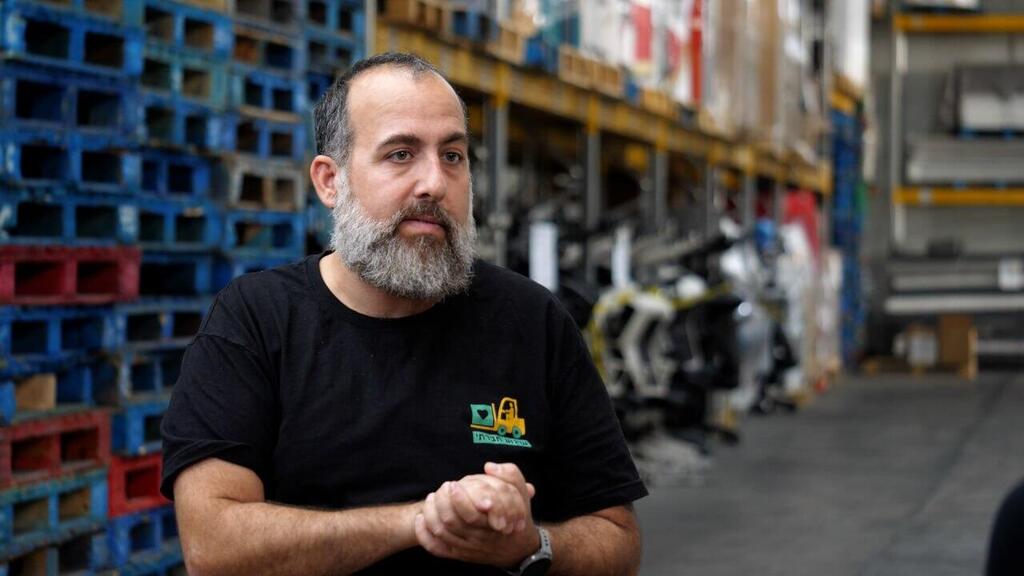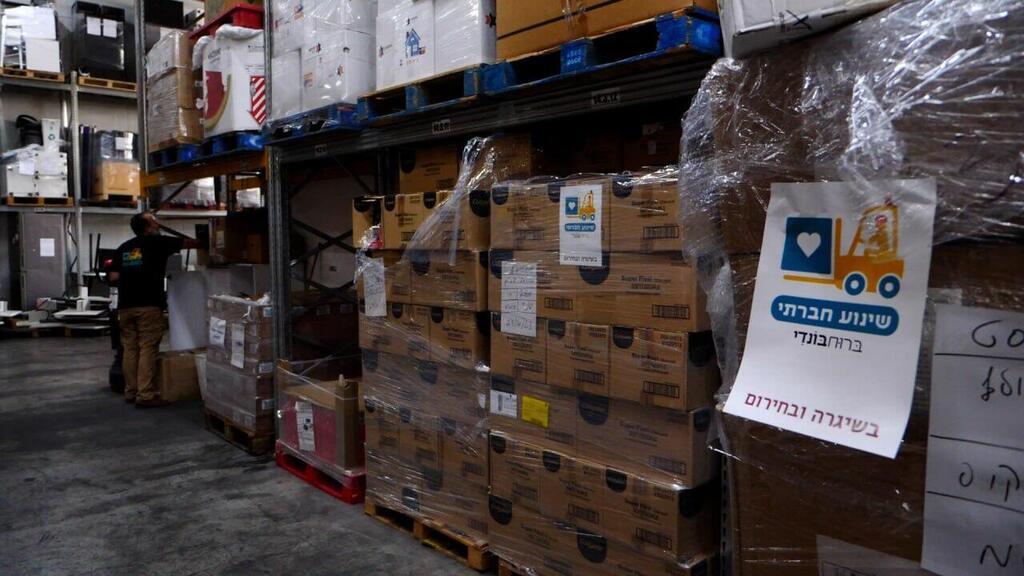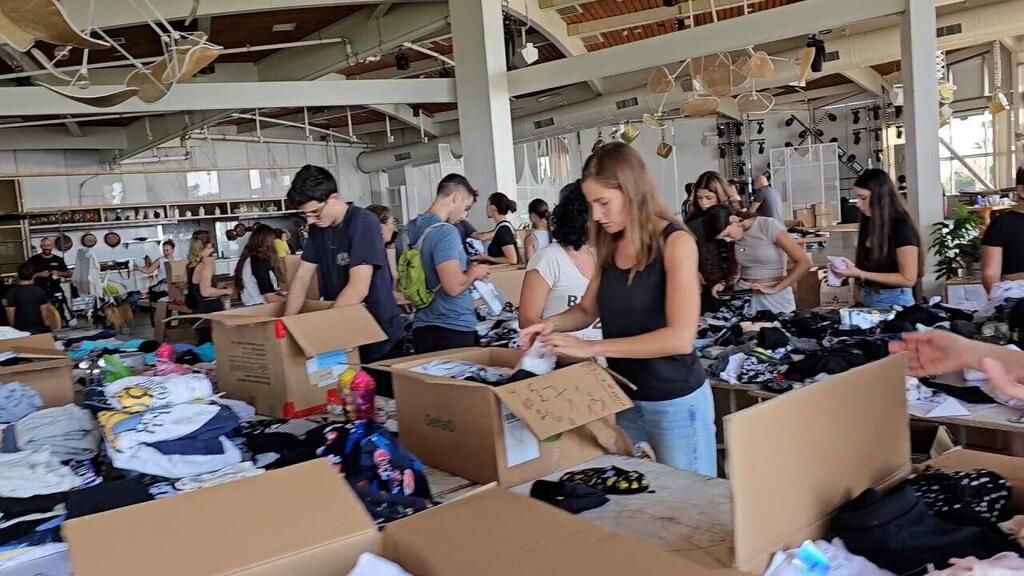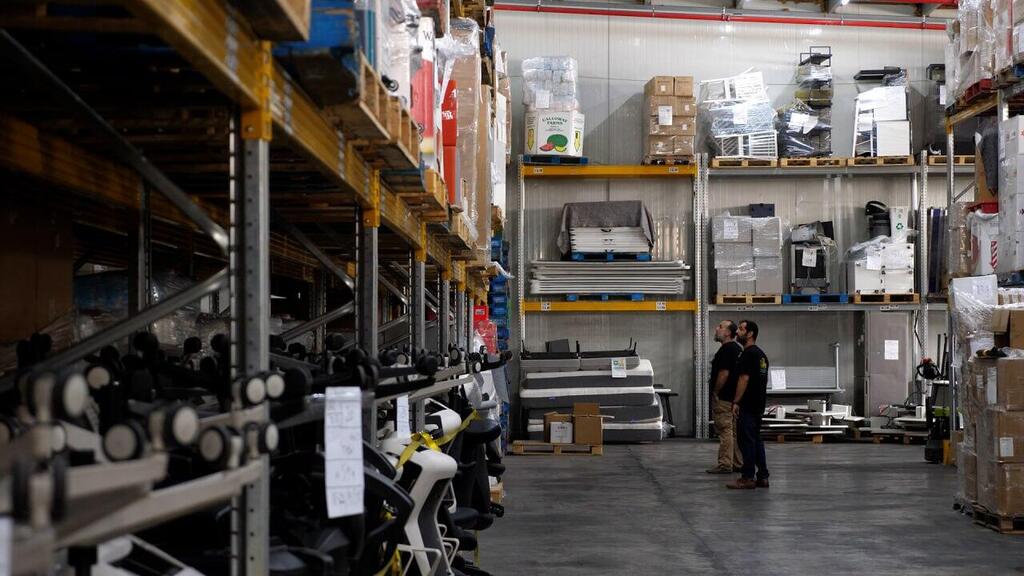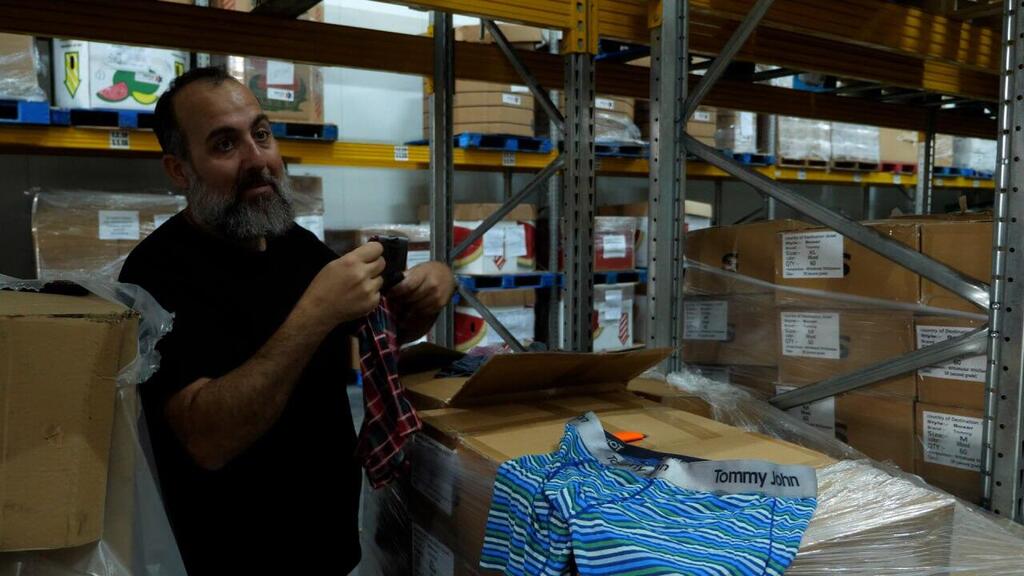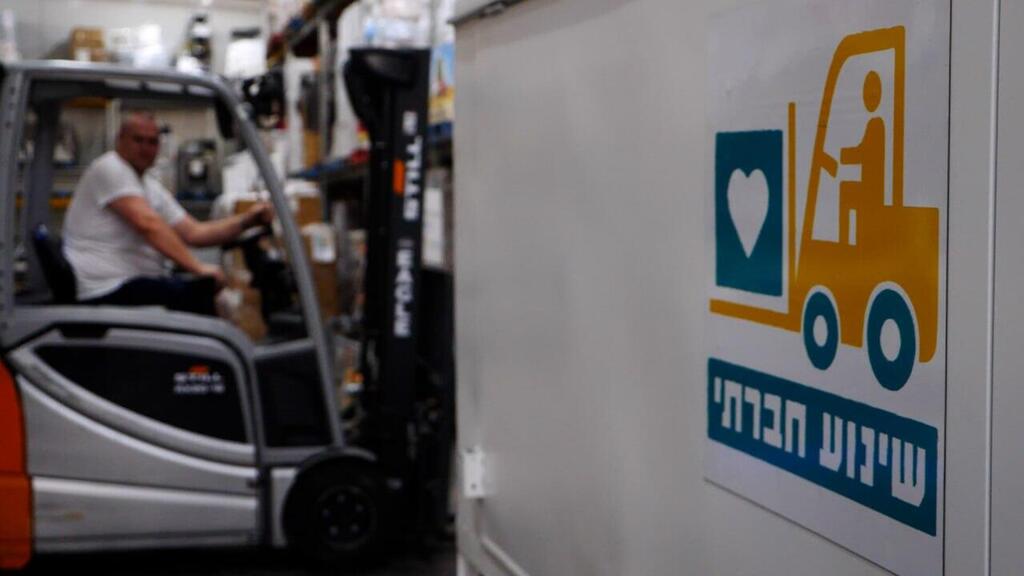the movers who transfer equipment from those who have surplus - to those who have none at all
(Video: Yaron Sharon)
Social Delivery was founded six years ago by social entrepreneur Tomer Shemesh, when he identified the need for an organization whose entire purpose is to transport items, of all kinds of dimensions and sizes, from places where there is surplus to places where they are needed.
More stories:
Israel has both a rich society on the one hand, and a severely poor society on the other. One well is consistently full, and even overflowing, and one well constantly remains lacking, never managing to fill up. “In my eyes, we are simply the bucket that transfers from the full to the empty," Says Shemesh.
Indeed, in a short time this "bucket" became an organization of immense social value, and it thus transfers between the "wells", goods and items amounting to approximately NIS 40 million per year.
The items span the spectrum: clothing, mattresses, sofas, furniture, computers, and refrigerators. The model is incredibly logical, simple, and environmentally friendly: on the one hand, the organization collects surpluses from retailers and businesses, and on the other hand, it transfers them to anyone who needs them, according to their needs.
These "surpluses" are completely new products, that we all buy in stores, but for one reason or another, are not intended for sale, and the companies plan to get rid of them in any case. Shemesh pointed to examples of when large hi-tech companies move offices, merges, or rebrands, making the current design obsolete.
"As of December 2023, Social Delivery has rescued more than 5,613,436 items, with a total value of more than NIS 128,050,000."
At once, such an organization is forced to replace all the furniture it owns with items that bear the colors of the new logo. In such a case, the solution offered by Social Delivery is perfect, both socially and environmentally: the items are moved to destinations where they are used by people and entities who would otherwise be unable to buy them, and they are not thrown in the trash and thus save unnecessary pollution and space in landfills.
As of December 2023, Social Delivery has rescued more than 5,613,436 items, with a total value of more than NIS 128,050,000. All the items are collected, and then stored for a period of time at the organizations warehouse Beit Shemesh, but not for long. The warehouse’s complete turnover rate stands at roughly two weeks.
“We receive goods and items from two main directions," explains Shemesh. "The first is retailers, who get rid of new clothes, cleaning supplies, mattresses, all types of textiles, bedding, towels, and many other such items. The second comes from high-tech offices. We collect furniture and items that a company has decided to throw away, for reasons of renewing equipment, renovations or redesigning. These items can literally be take right to apartments.”
"It's called a 'breathing warehouse'. Goods are constantly coming in and out," explains Shemesh. "Almost all the items here are already been ordered and have a final destination.”
"I have to admit that I did not imagine that we would see Israeli refugees inside our own country."
Many products we collect are given an address and a destination before they even get here." Despite the great demand for the items, the organization’s policy over the years has been to keep about 20% of the stock in warehouses, in preparation for emergency situations.
"We saved for emergencies, not knowing exactly for what purpose. I admit that we didn't know that there would be a scenario of such a war. We were thinking more along the lines of an earthquake. But then the war broke out, and the kibbutzim and towns were evacuated, and we immediately began to distribute the entire 20%.
"I have to admit that I did not imagine that we would see Israeli refugees inside our own country. We very quickly filled the new and temporary homes of the evacuated citizens, who had to start all over again, with televisions, refrigerators, computers, and everything they needed."
We never imagined we'd see refugees in Isreal
Since the outbreak of the war, Social Delivery switched to operating in an emergency focusing on the highest needs in the situation: evacuees from combat zones, and citizens who fell into economic hardship as a result of the war.
Within a few hours on Sunday, October 8, we were already in full emergency mode, and directed most of our effort to take care of those who were most affected," says Shemesh. "I must admit that I did not imagine that we would see an Israeli refugee crisis. Very quickly we filled the new and temporary homes of the evacuated citizens, who had to start all over again, with televisions, refrigerators, computers, everything that was available.
"We started distributions at sites where evacuees were staying, mainly hotels. It sounds awfully nice - 'a hotel,' - but you don't have your clothes there, and in the Dead Sea you don't even have a place to buy these things. Everything we had in stock - we immediately dispersed and transported to hotels and the evacuees."
"So that they don't feel like they are ‘needy’, we presented the equipment like in a store, so that they would have the feeling that they were going shopping. We arranged according to sizes and colors and ages. We distributed an entire load of suitcases, because when people move between places, they need some kind of cabinet or storage equipment, which they can take with them from place to place."
There are also a lot of snacks and extra little luxuries, which were immediately distributed to the soldiers in the field: "For example, we received a crazy amount of boxer briefs, new! Everything is new. It will go to the soldiers, underwear is very, very important to whoever receives it."
We arrived at the 'Nofi HaBshor' school in the Gaza Envelope with four trucks and 60 or 70 'Achim LeNashek' volunteers, took all the equipment that was there, and basically moved the entire school to the Dead Sea and Eilat. We let them go back to studying with the desks and chairs they are used to. An entire school was packed and moved to Eilat.
An entire school was packed and moved to Eilat
One of the most significant projects carried out by Social Delivery was not based on donations or collected goods at all. "After a short period, a real need arose in Eilat and the Dead Sea, places with the largest concentrations of evacuees, to establish schools for the children.
And this is what they did there: they literally established a school from scratch. They had no furniture, so they asked us if we had any way to get desks and chairs. We said, wait! Why don't we take all the equipment they had in the previous school, and move it all to the new school?
"That's what we did - we arrived at the Nofi HaBsor school in the Gaza Envelope with four trucks and 60 or 70 volunteers from Achim LaNeshek, we took all the equipment that was there, and in fact we moved the whole school to the Dead Sea and Eilat. We let them go back to studying with the desks and chairs they are used to."
7 View gallery
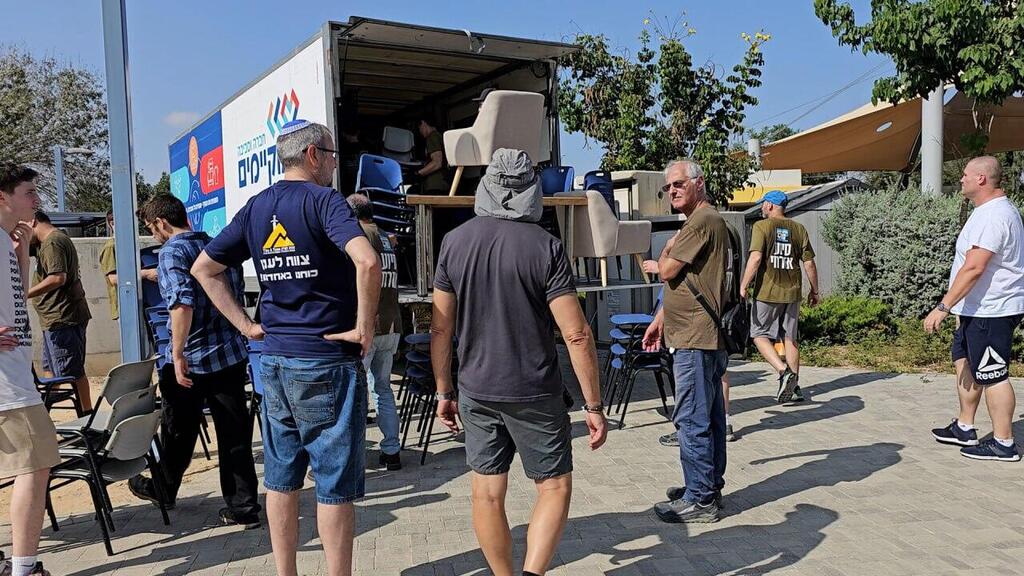

They came with four trucks and dozens of volunteers from Achim LAneshek and brought the Nofei HaBsor School to Eilat.
(Photo: Yaron Sharon)
While packing the contents of the school, the Social Delivery team noticed many personal items of the children who studied at Nofei HaBsor. "We saw books, bags and school supplies with the children's names on them. I called the principal and suggested that we take everything and bring it to the children in Eilat, but then she said, I can't know if you are taking something belonging to a child who may no longer be with us. So we didn’t do that."
Tomer Shemesh: "I don't see it as giving at all, but rather professionalization and success in balancing surplus and need, maximizing resources. I don't see our initiative as an act of charity or kindness. It's a kind of career. The fact that it does good for others is a great privilege for me”
A serial social entrepreneur
It’s worth expanding a little bit about Tomer Shemesh himself, a model of civil society and social activism. He is 44 years old from Moshav Aviel near Binyamina, married and the father of four children, and was a farmer for many years. When he grew dates in the Jordan Valley, he transferred all the income from growing dates to educational activities in the periphery.
Then he managed one of the first medical cannabis farms in Israel, moved to work for human rights organizations, and then returned to agriculture. In this role, he worked as part of Leket Israel, an organization that collects and saves surplus agricultural produce in the fields and orchards, and delivers them to save needy families.
"Only then did I realize that I was even an entrepreneur at all," he says, referring to the initiative to establish Social Delivery. "I don't see it as giving at all, but rather professionalization and success in balancing surplus and need, maximizing resources. I don't see our initiative as an act of charity or kindness. It's a kind of career. The fact that it does good for others is a great privilege for me.”
A decade ago, Shemesh founded the “Junkyard” group on Facebook, which has more than 110,000 members, all junk enthusiasts, who share items they found on the street or recycled in their homes.
He does not rest for a moment, and alongside the intensive work at Social Delivery he is currently establishing a new venture for community sustainability centers, in partnership with large local authorities. "I never read a book and never graduated from high school," he admits, "but I received an honorary degree from Rupin College.
"I want to harness the business companies, even those who don’t donate through us - to give us everything they have left over, furniture, computers, to pass on their surplus. Don't keep, don't throw away - pass on. Even if it's not to us but directly to the families who need it."
Businesses should pass things on, not throw them away
Despite the effectiveness of the aid to the evacuees in the war and despite the successes in the past, Tomer Shemesh says he is very afraid of the near future. "I'm afraid, because we don't know what the economic situation in Israel will be. There is an expectation of 300,000 unemployed in Israel in the coming month. These are numbers we’ve never seen.
"I am afraid that we will have a tremendous load and a great demand. We’ve never got to the point where we say 'sorry, we don't have enough to give you', and I'm very afraid of getting to that point now. That's why I want to harness the businesses and retailers, even those who don't donate through us today - to give us everything they have extra-- furniture, computers, to pass their surplus on.
"Don't store thing, don't throw away - pass it on. Even if it's not to us but directly to the families that need it. "That's why we're opening another warehouse. Our intention is to be the main supplier of necessary items - at no cost at all - to all those evacuees and to all the communities that receive them, for the benefit of their new lives. I hope it can also be in their original homes or in their original communities."





